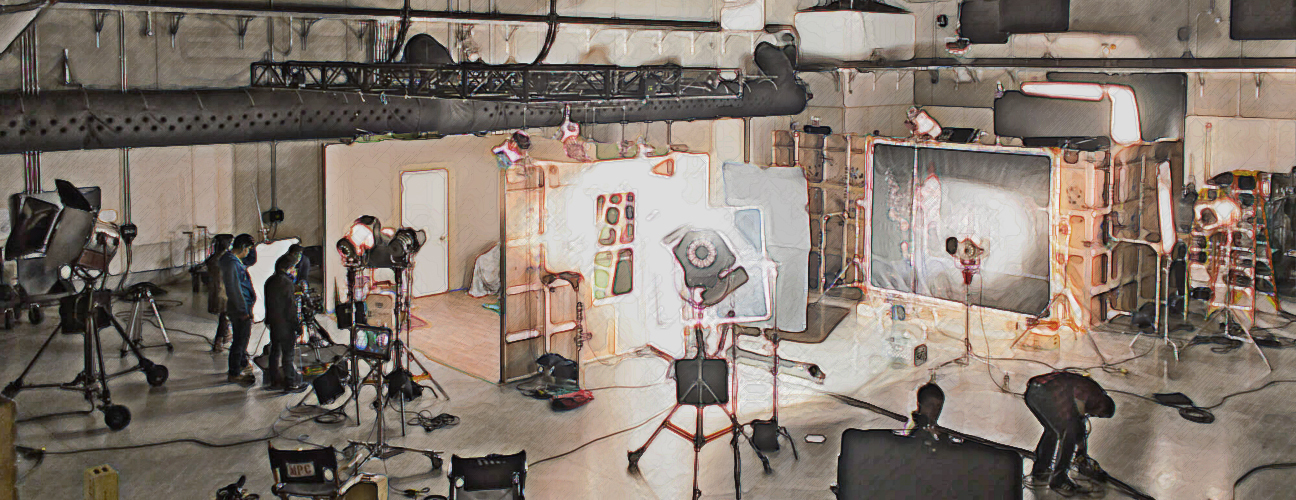There area many different opinions when asked if going to film school is worth it. But one thing is for sure…
Making films is a very tough undertaking and requires years of hard work before reaching the level of experience needed to create a compelling audiovisual product, such as a movie, TV show, documentary, commercial, etc… Nobody wakes up one morning and is able to make an oscar-winning movie. It simply doesn’t happen.
You have to learn the theory and mechanisms of visual storytelling somewhere.
Luckily, nowadays it has become much easier to learn the art of filmmaking.
You can…
Do it on your own. You’re an autodidact and learn the craft by watching YouTube tutorials and essays, reading books, and getting your hands dirty by producing your little experimental movie. There are so many online resources available that teach you everything you need to know about the basics of making an audiovisual project. This approach is for sure the longest and hardest way since you have to have a lot of self-criticism and motivation to keep digging through the online resources available and make your own film curriculum.
- Crewing. Pick up the phone and start calling production companies or digging through ads on craigslist or other job sites till you land a job on a real film set or TV show. Since you start with zero experience you’ll probably start at an entry-level job such as Production Assistant (PA), in an office, or if you are lucky, on set. You’ll be working extremely long hours and doing many different assistant tasks such as taking out the trash, bringing coffee, setting up tables for lunch, etc…
Don’t expect to be on set and see how the director, actors, and crew are making the movie, this will happen much later down the line and is primarily based on your drive and eagerness to move up the ladder. It’s still advisable to pick up a book or two and consult online resources to learn and understand what is happening on set. With this approach you’ll see the theory you are reading up on, applied to a professional set right away.
By working on set you’ll also be able to make excellent connections with collegues who will hire you on future productions.
- Go to film school to get a solid foundation and understanding of how films or any audiovisual product is made and learn about the tools, such as cameras, lighting, audio, and editing, to make small little films before entering the industry.
Whether going to film school is worth it or not depends on a variety of factors, such as your personal goals, financial situation, and career aspirations.
Below we’ll discuss some potential benefits and drawbacks of attending film school:
Let’s start with…
The Benefits of going to film school:
Film Theory
The most important reason to go to film school is to learn the theory on how audiovisual products such as movies, Tv-shows, documentaries, etc… are being made and the mechanism behind visual storytelling.
There are many different paths to choose from in film school that focus on a specific aspect of audiovisual media.
The ones who like to organize and manage can choose to focus on producing films or audiovisual media. They’ll get to understand the creative process, planning, budgeting, and managing the creative team assembled to get the best product possible.
For real creative minds that want to become writers or directors, the focus will be on how style and content can create an audiovisual product. They’ll learn how to create the initial concept, develop it and guide the entire process to deliver a film or an audiovisual product.
For those whose interest is more towards the technical aspect of making an audiovisual product, learn how audio, video, and editing tools are used throughout every step of the creative process.
Different film schools often have a different focus, but in general, all of them will give you a very good basic understanding of the theory behind how a film, TV show, documentary, commercial, or any other audiovisual product is made.
Filmmaking has been around for over a century and the concepts, ideas, and theory have not changed much since the early days. The style has changed and the technology has improved tremendously, but the way a story is told on screen hasn’t changed much at all. Film schools teach an in-depth understanding of how and why things in an audiovisual production are done the way they are done.
This brings us to the next point.
Hands-on experience with film equipment and techniques.
In film school you’ll have the opportunity to learn how to work with cameras, sound equipment, lighting equipment, editing systems, etc… Many of these tools are expensive and a good understanding of how to use them properly is needed before entering the industry. Not understanding how the tools are used can cause some serious damage to them and therefore it’s important to get hands-on experience and take the time to learn how to operate them properly.

Learn from industry professionals and mentors.
Many of the teachers in film school have worked or are still working in the film industry and bring a lot of experience to the table to pass on to their students. They’ll teach the theory behind filmmaking and how to handle and work all the different technical tools needed to make a movie or TV show. This also gives the students opportunities to ask questions and receive in-depth answers because on film sets there simply is no time, or at least very little, to have a teachable moment without holding production up.
Opportunities to fail.
It sounds harsh, but yes, film schools give the room to fail and learn from mistakes. This is also the best way to learn the craft. By doing everything right the first time nothing will be learned. Students who don’t make mistakes most likely don’t risk trying something new or don’t want to step out of their comfort zone. Looking at the mistakes or failures makes students understand why something went wrong and will prevent it from happening in the future. In film school making mistakes doesn’t have an impact on a career, on the contrary, it will create a strong base before stepping into the audiovisual industry. Making a serious mistake on set can be career-ending.
Making connections
This is by far the most important reason to go to film school. By working together on projects connections with fellow students are made. These connections are very important in any career in the industry. When someone is asked for a recommendation for a job on set, they often recommend the people they connected with the best in film school. The whole industry is based on connections and friends hiring friends they can trust and by going to film school you’ll be able to make those connections needed to get your first payday in the industry.
“The film industry is all about friends hiring friends”
Nowadays you can easily learn film theory online, in books, or by watching YouTube videos. The online resource for learning about filmmaking is pretty large and very easily accessible. However, you won’t be able to build those vital connections needed to start your career in the industry if you didn’t go to film school. This alone is often worth the money spend.
This brings us to…

The drawbacks of going to film school:
High cost of tuition
Film schools or any other art school are known to be quite costly. The better the program the school offers, the more it will cost. It’s important to research the programs to make sure it satisfies the goals you want to achieve when graduating. Often the reason for the high cost is not only because of the tuition that must be paid. It’s also the cost of the materials to make several projects during the curriculum, especially the thesis films to graduate can be quite pricy.
Some film programs at film schools can be up to $250.000, which will take years to pay off the loans. This can become quite painful considering the next point…
No guarantee of a successful career in the industry after graduation.
Sadly, even going to the best film school in the world does not guarantee a successful career. You can do everything right trying to make a career in the industry and still fail. The film industry is super competitive and there are just not enough new positions that need to be filled to give all the new graduates a job. If graduating from film school was hard, it is even tougher to make a career and a living, working in the film industry. It’s probably fair to say that one out of two graduates won’t find a job in the industry, at all.
“You can do everything right trying to make a career in the industry and still fail”
Still start at the bottom after graduation.
Even after graduation, it takes years before becoming a working director, producer, or ‘head of department’, such as a cinematographer, production designer, or editor. Graduates still need to start at the bottom of the industry in assistant positions and work their way up from there. And be prepared that along the way there you’ll have to work many freebees to build up a reel and credibility.
The difference between graduating from film school vs somebody who didn’t go to film school is that the ones who did will understand and be familiar with everything that happens on a film set and therefore climb up the ladder much quicker. You are also more likely to be offered assistant jobs in the more technical departments which require knowledge of how to handle expensive film gear. A successful career in the industry is a marathon, not a sprint. It takes patience, perseverance, hard work, and a big dose of luck.
“A successful career in the film industry is a marathon, not a sprint”
Not all teachers or mentors have industry experience.
Research film schools well before deciding on which one to attend. There are great programs and not-so-great ones. There are programs where teachers have or had no industry experience because they simply weren’t able to find a job or get a career started in the industry. Therefore, they turn to teach the theory taught in film schools. There is a big difference between film theory and knowing the gear and working it on a real set. The theory often applies, but the execution is very different from what’s been tat in film schools. Teachers and mentors who have or had real industry experience can prepare film students much better on what to expect after graduation and sometimes also get them their first break in the industry.
Not all film schools provide hands-on experience with up-to-date technology.
There are many different film programs and some are just focused on the creative aspect, such as script writing, directing, etc… but not all of them offer the opportunity to work with professional film gear during the curriculum. If the interests lean more towards a job on the technical creative side of the business, such as cinematographer, production designer, editor, sound engineer, etc… it’s better to choose a program that specifically promotes it. Those programs might also be more costly because film gear isn’t cheap to buy, plus for the school staying up to date with the latest tools used in professional productions can seriously boost the cost of attending the program.
Conclusion
Ultimately, whether going to film school is worth it or not is a personal decision. Consider your goals, financial situation, and other options for learning and gaining experience in the film industry. Research different film schools, talk to alumni and industry professionals, and weigh the potential benefits and drawbacks before making a decision.

